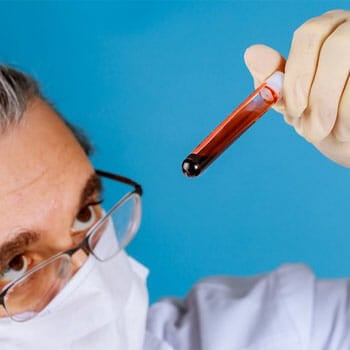Are you feeling muscle pains or cramps that don’t disappear?
If it’s been a few weeks since your last workout and you still feel stiff, it may not be something just to overlook.
Sore muscles can sometimes indicate a more severe condition like a disease, muscle injury, or serious muscle damage.
That’s why we’ve spent hours delving into what a creatine kinase test is and how it could potentially save your life.
Quick Summary
- The Creatine Kinase test is a medical procedure used to determine the creatine phosphokinase in the blood.
- A creatine phosphokinase test is done by inserting a needle into your vein, extracting some blood, and finally sending the blood extract to the lab.
- This test is essential for diagnosing conditions like muscular dystrophy and rhabdomyolysis and assessing muscle soreness after intense physical activities.
- In my opinion, regular exercise, hydration, and careful medication management can effectively lower and manage CK levels, promoting better overall health.
What Is a Creatine Kinase Test?

A creatine kinase (CK) test measures the levels of creatine phosphokinase (CPK) in the blood.
This enzyme, found in muscle tissues like skeletal muscles (CK-MM), the brain (CK-BB), and the heart (CK-MB), usually exists in small amounts in our blood.
However, if these isoenzymes spike, it's a red flag. For instance, if someone's CK-BB levels are unusually high and they're struggling to remember recent events, it could point to brain trauma needing further checks.
When excessive amounts of any of these isoenzymes are discovered in the bloodstream, they can be singled out to determine what may be the root cause of a problem.
For example, take an individual with higher than normal CK-BB levels who finds it difficult to recall what they did in the last few days; there is a good chance this person suffers from a brain trauma which should be further investigated.
How Is a Creatine Kinase (CK) Test Performed?
A creatine phosphokinase test is performed by inserting a small needle into a vein in your arm.
From there, a small amount of blood sample is extracted into a vial, where it is sent to the lab for further testing.
Why Would Someone Need a CPK Test?

I remember needing a CPK test when my muscle soreness lasted unusually long after a marathon.
This is primarily a concern if they've recently engaged in intense physical activity such as contact sports.
Your healthcare provider often uses a creatine kinase test to diagnose chest pain, muscle injury, or disease, with the most common ones being muscular dystrophy and rhabdomyolysis.
Muscular Dystrophy

According to the Muscular Dystrophy Association, muscular dystrophy is a muscle disease inherited from birth caused by abnormal gene mutations that interfere with the body’s ability to create healthy muscles.
Over time, this disease results in progressive muscle weakness and can lead to problems such as:
- loss of balance,
- muscle cramps and pains,
- numbness or tingling sensations,
- and issues contracting or relaxing certain muscle groups.
Rhabdomyolysis
Rhabdomyolysis results from muscle damage due to trauma or conditions like heat stroke and strenuous exercise [1].
In severe muscle damage, muscle cells can die and release their contents into the bloodstream.
This can lead to serious diseases such as kidney failure, where the kidneys are unable to function properly and filter out waste. In rare cases, this can lead to death if not properly treated.
Common symptoms of rhabdomyolysis include muscle pain in the lower back, thighs, or shoulders, muscle weakness in the limbs, dark red or brown urine, and less frequent urination.
What Causes CPK Levels to Rise?

Total CPK levels can rise due to skeletal muscle injury, strenuous exercise, and heart attacks. Other causes include alcohol withdrawal (delirium tremens) and as a side effect of certain supplements or medications such as statins and amphotericin B.
1. Skeletal Muscle Injury
Individuals that suffer from muscle diseases such as muscular dystrophy and rhabdomyolysis, and:
“Individuals who regularly participate in high-volume, intense exercise, tend to have significantly raised base levels of serum CK [test results] compared to sedentary and moderately exercising individuals... this suggests that [test results for] CK flux into the serum is a natural and normal [set of changes accompanying] regular exercise. [2]”
- Marianne F. Baird, Associate Researcher
Additionally, participating in strenuous exercise that results in severe muscle damage can increase levels of CK, such as a hernia or torn tendons.
2. Heart Damage

In circumstances where the heart muscle is injured, the heart fibers may pour into the bloodstream.
This results in a spike in CK levels due to the fact that the heart is a major organ that is responsible for many bodily functions.
If left untreated, prolonged heart muscle injuries or heart damage can lead to complications such as a heart attack or stroke.
3. Brain Injury
While the brain is not considered part of the muscles, its cellular structure is similar enough to be treated as one.
As a result, CK levels can rise in individuals that suffer from brain damage.
For example, in a study of twelve patients that suffered a severe brain injury, traces of CK-BB were present in the bloodstream of eight patients [3].
In some cases, the levels of CK may not peak until two days after its cause, making it difficult for your healthcare provider to detect any abnormalities.
How Can You Lower Your CK levels?

In my research, I discovered that regular exercise, similar to my routine during military training, effectively reduced my CK levels [4].
This is why doctors recommend people who are at risk of a heart attack undergo regular exercise consistently.
By lowering CK values, it prevents the possibility of a heart attack and other health complications.
However, if CK levels are already elevated, one should avoid exercise for at least seven days.
Drinking plenty of fluids is another method of reducing high CK values.
As high amounts of this enzyme may cause kidney failure, drinking water can help to flush out excessive CK and aid kidney functions.
Lastly, as medications and supplements can increase CK levels, refraining or reducing intake can help lower CK values.
FAQs
How To Test Creatine Kinase Levels?
CK levels can be tested in person through your healthcare provider or by an online blood test.
They can also be tested through lab tests online. To test for CK levels online, the patient would need to obtain a blood sample, then proceed to send it to a lab of their request.
How Long Do CK Test Results Take?
On average, one can expect CK test results within 1-2 days or longer, depending on delays.
Is a CK Test Painful?
Patients that test levels for CK may feel a minor sting when the needle is inserted into their arm.
For many, the psychological fear of needles will be more of an issue than the actual pain itself.
References:
- https://www.testing.com/tests/creatine-kinase-ck/
- https://www.ncbi.nlm.nih.gov/pmc/articles/PMC3263635/
- https://www.ncbi.nlm.nih.gov/pmc/articles/PMC492030/
- https://www.bicycling.com/training/a39048286/what-is-creatine-kinase/
About The Author
You May Also Like






